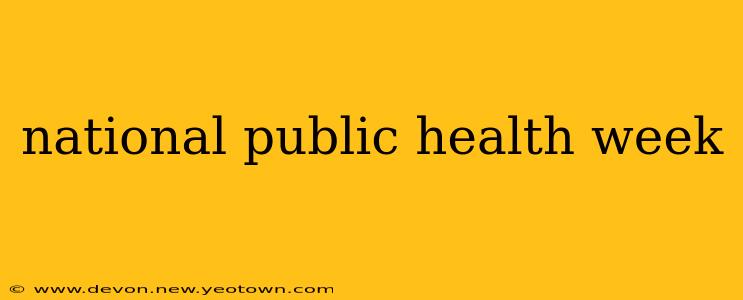National Public Health Week (NPHW), celebrated annually in April, isn't just another week on the calendar; it's a vibrant testament to the tireless efforts of public health professionals and a powerful call to action for all of us. It's a time to reflect on the incredible strides we've made in improving community health and to acknowledge the persistent challenges that demand our collective attention. This year, let's delve deeper into the significance of NPHW and explore the critical issues it highlights.
Imagine a world without readily available vaccinations, where infectious diseases spread unchecked, and where preventable deaths were commonplace. That was the reality for much of human history. The advancements in public health over the past century are nothing short of miraculous, transforming our lives and extending our lifespans in ways we often take for granted. NPHW offers a crucial opportunity to appreciate this progress and to champion continued innovation.
What is the Purpose of National Public Health Week?
The primary purpose of NPHW is to raise awareness about the importance of public health and to advocate for policies and programs that protect and improve the health of communities. It's about shining a light on the often-unsung heroes – the epidemiologists, health educators, and community health workers – who work tirelessly to prevent disease, promote wellness, and respond to health crises. It's a week dedicated to educating the public about critical health issues and empowering individuals to make informed decisions about their well-being.
What are the Main Topics Covered During National Public Health Week?
Each year, NPHW focuses on specific themes relevant to current public health concerns. While the specific themes vary, they generally encompass a wide range of topics, including:
- Disease prevention and control: This includes efforts to prevent the spread of infectious diseases, chronic disease management, and promoting healthy lifestyles to reduce the risk of illness.
- Environmental health: Protecting the air we breathe, the water we drink, and the food we eat is crucial to overall public health. NPHW often highlights environmental factors that impact well-being.
- Health equity: Ensuring that everyone has access to quality healthcare, regardless of their race, ethnicity, socioeconomic status, or geographic location, is a core tenet of public health.
- Emergency preparedness and response: NPHW emphasizes the importance of being prepared for and responding effectively to public health emergencies, whether natural disasters or outbreaks of infectious disease.
- Mental health: Addressing mental health is increasingly recognized as a crucial component of overall well-being. NPHW often features initiatives to promote mental wellness and reduce stigma.
How Can I Participate in National Public Health Week?
Participation in NPHW can take many forms. You can:
- Learn more about public health: Explore reputable sources of information to deepen your understanding of relevant issues.
- Support public health organizations: Donate to or volunteer with organizations working to improve community health.
- Advocate for public health policies: Contact your elected officials to express your support for policies that prioritize public health.
- Promote healthy behaviors: Make healthy choices in your own life and encourage others to do the same.
- Spread awareness: Share information about NPHW and its themes on social media.
What are Some of the Biggest Public Health Challenges Today?
We face many complex public health challenges, including:
- The opioid crisis: The ongoing opioid epidemic continues to devastate communities across the nation.
- Climate change: The impact of climate change on public health is increasingly significant, with effects ranging from extreme weather events to the spread of infectious diseases.
- Health disparities: Persistent health inequalities based on race, ethnicity, and socioeconomic status remain a significant concern.
- Chronic diseases: Chronic diseases like heart disease, cancer, and diabetes are leading causes of death and disability.
National Public Health Week serves as a powerful reminder that public health is not just a matter of individual responsibility; it's a shared responsibility. It's a collective effort that requires the collaboration of individuals, communities, and governments to create a healthier future for all. Let's seize this opportunity to celebrate the progress made and recommit ourselves to the ongoing work of building healthier communities.

